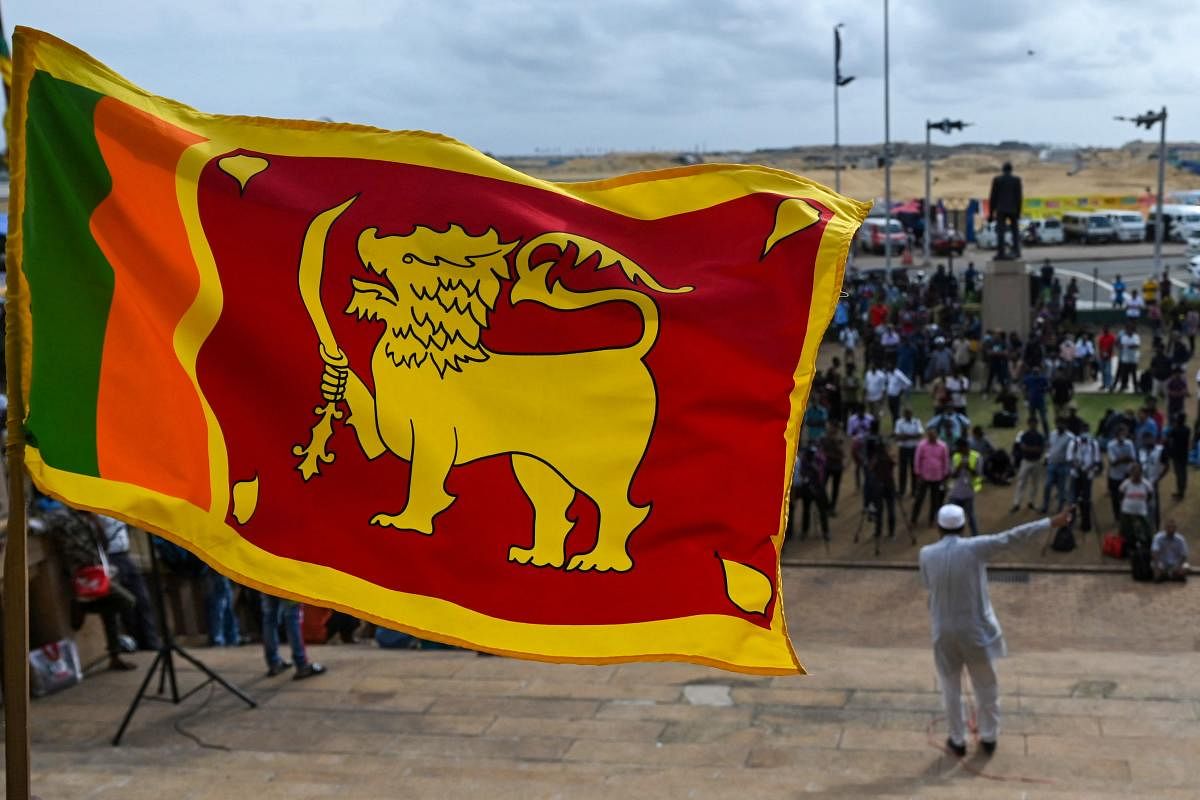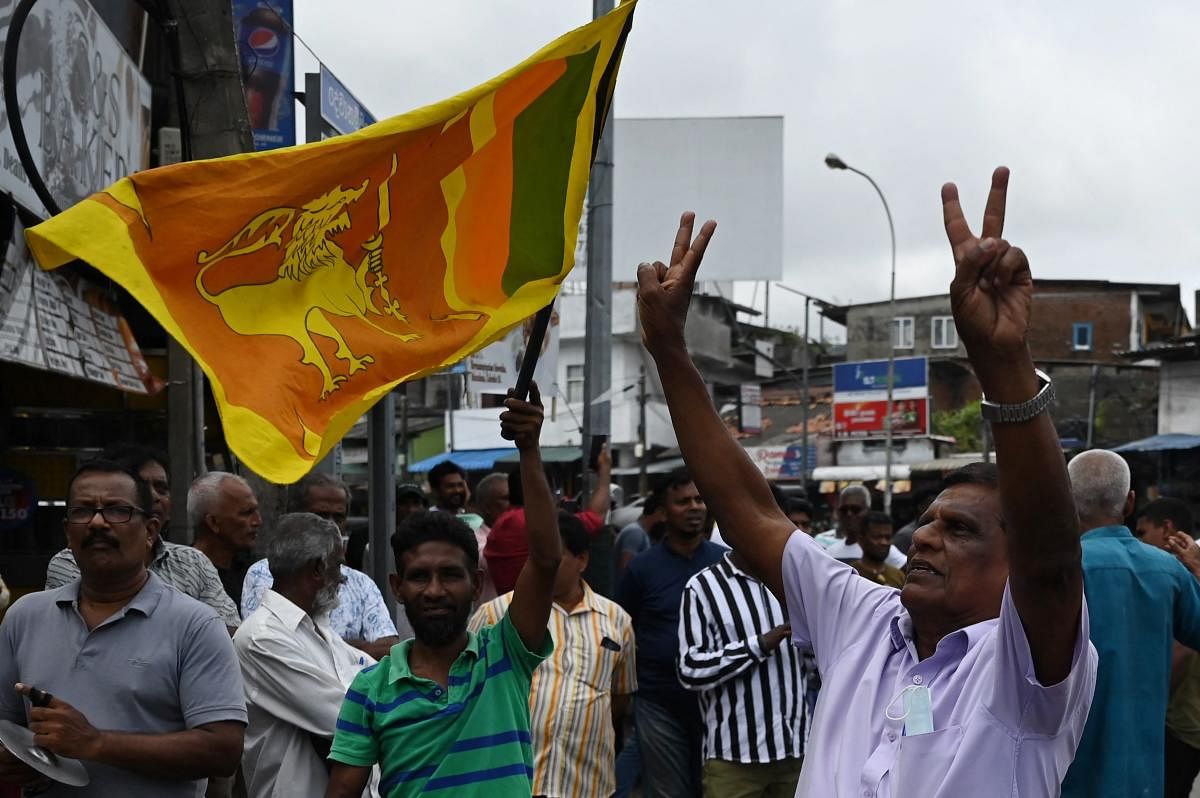
New Sri Lankan president vows tough action against troublemakers.

Supporters of newly electedSriLankan President Ranil Wickremesinghe celebrate in Colombo, Wednesday, July 20, 2022.
Disappointment at Sri Lanka protest camp after election
A sullen crowd reacted to the election ofSriLanka's new president with disappointment Wednesday, near the protest camp where they last week celebrated chasing his predecessor into exile. Around 200 people gathered under a sweltering morning sun to watch the contest outside the presidential secretariat in Colombo, one of several government buildings stormed by protesters earlier this month.
Weerasinghe says he expects a stable government that can implement difficult economic reforms
Sri Lanka's new president will have to deal with daunting political challenges and his reforms should include tax rises to stabilize a devastated economy, the central bank governor told the Financial Times on Wednesday.
India said on Wednesday that it will continue to be supportive of theSriLankan people's quest for stability and economic recovery, through democratic means and values, established democratic institutions and constitutional framework.
Outside the presidential secretariat, where protesters camped for months to demand Rajapaksa step down,
Outside the presidential secretariat, where protesters camped for months to demand Rajapaksa step down, civil enginer Nuzly Hameem said he was "disappointed" by the result.
"We expected more from our parliamentarians," he told AFP.
The protests would "obviously" continue, he said, but added "We are burnt out. It's been four months."
One by one, the legislators entered ballot booths set up on the floor of the chamber to choose between the three candidates.
Previous elections have been marred by allegations of corruption and vote-buying.
Wickremesinghe's main opponent in the vote was SLPP dissident and former education minister Alahapperuma, a former journalist who was supported by the opposition.
The third candidate was Anura Dissanayake, 53, leader of the leftist People's Liberation Front (JVP), whose coalition has three parliamentary seats.
Lawmakers in 225-member house ranked candidates in order of preference, with more than half the vote needed for victory -- a mark Wickremesinghe crossed on first preferences.
He is elected for the balance of Rajapaksa's term, which runs until November 2024.
Sloganeering and protest under way outside Presidential Secretariat after Ranil Wickremesinghe was elected as Sri Lanka President
Country in very difficult situation, we have big challenges ahead, says new President Wickremesinghe
Six-time PM Ranil Wickremesinghe wins Sri Lanka presidency
India High Commission slams "baseless and purely speculative media reports" about efforts at political level from India to influence political leaders in Sri Lanka
General Secretary of the Tamil National People’s Front (TNFP), MP Selvarasa Gajendran has abstained from voting: Local media
'Ranil has regained the acceptance of the urban middle classes by restoring some of the supplies like gas and he has already cleared government buildings showing his firmness'
Political analyst Kusal Perera agreed Wickremesinghe had a "slight advantage", despite his own party securing just one seat at the August 2020 elections.
"Ranil has regained the acceptance of the urban middle classes by restoring some of the supplies like gas and he has already cleared government buildings showing his firmness," Perera said.
The contest appeared to be close as lobbying intensified ahead of the vote. Two smaller parties pledged their support to Wickremesinghe's main challenger, Dullas Alahapperuma, while a Tamil party with two votes said they were switching sides to support Wickremesinghe.
Outside the parliament, hundreds of heavily armed troops and police stood guard, but there were no signs of demonstrators.
The new president elected on Wednesday will serve the remaining tenure of Rajapaksa till November 2024. After the election, Parliament will convene again on July 27.
This is for the first time in 44 years that Sri Lanka's Parliament will directly elect a president. Presidential elections in 1982, 1988, 1994, 1999, 2005, 2010, 2015 and 2019 had elected them by popular vote.
Wickremesinghe, 73, is seen as the frontrunner as he has the backing of the ruling Sri Lanka Podujana Peramuna (SLPP).
Alahapperuma’s name was proposed by the Leader of the Opposition Sajith Premadasa and Member of Parliament G L Peiris seconded it. Wickremesinghe’s name was proposed by the Leader of the House and minister Dinesh Gunawardena and MP Manusha Nanayakkara seconded it. Dissanayake's name was proposed by MP Vijitha Herath and MP Harini Amarasuriya seconded it.